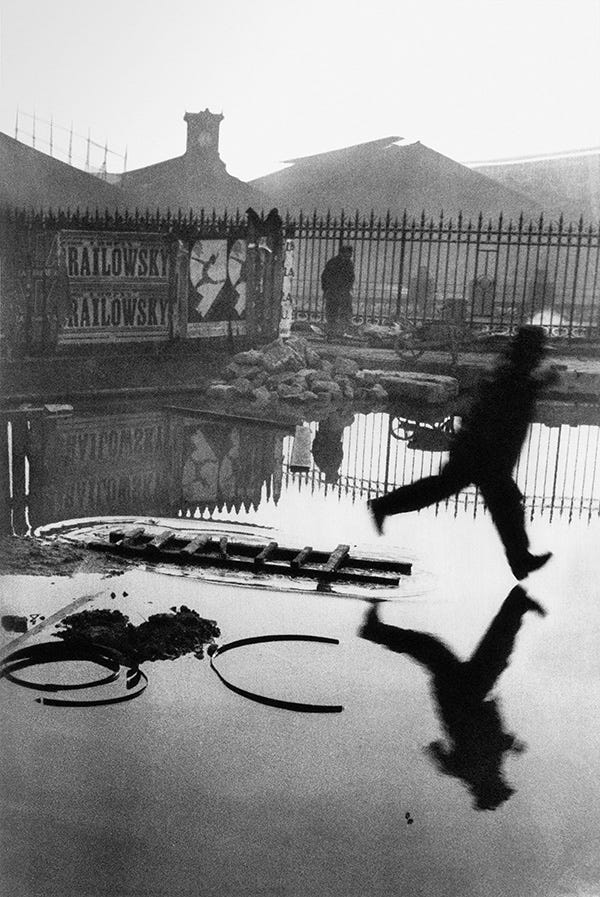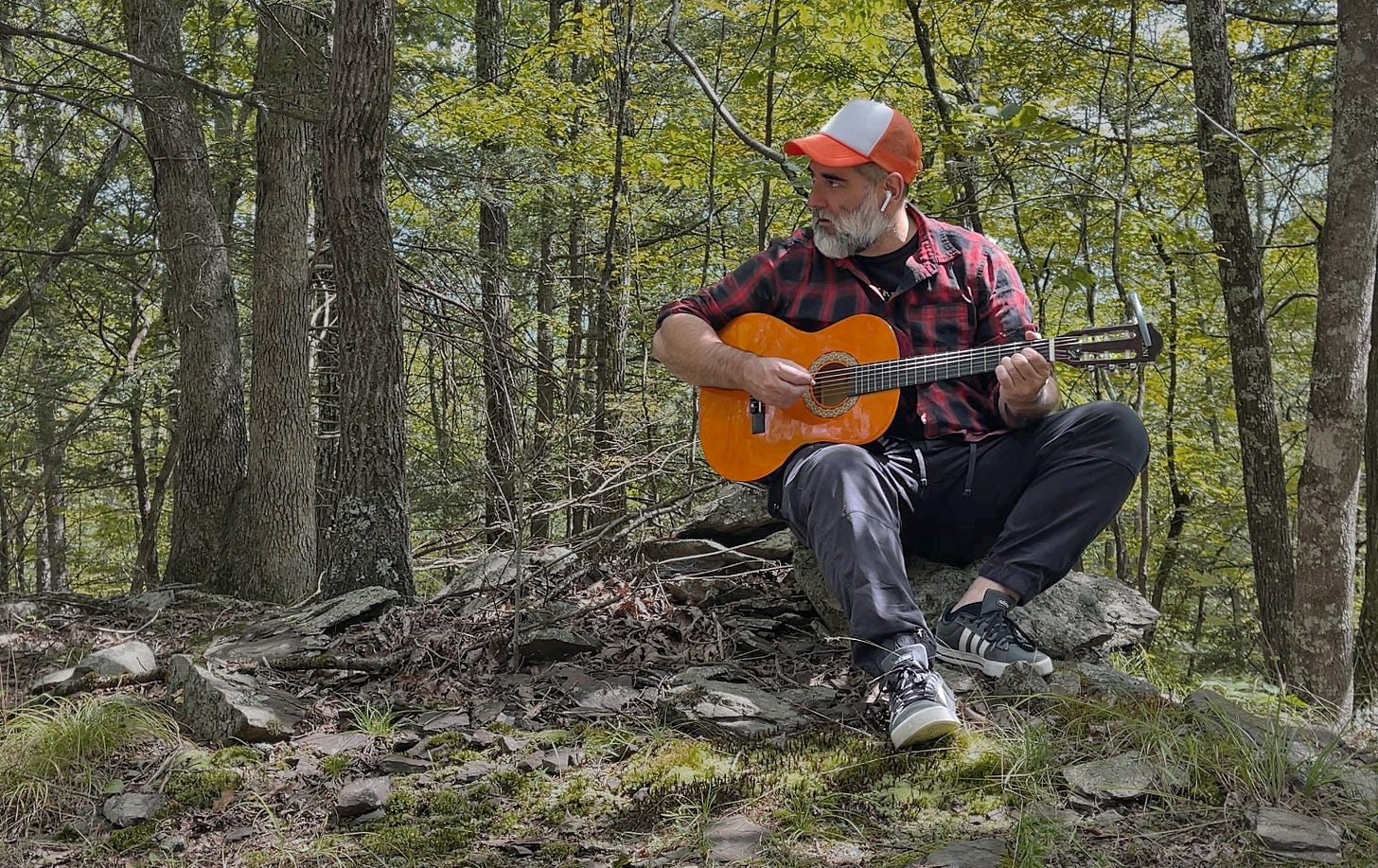The Inevitability of Change
Redefining Who You Are When Your Job No Longer Defines You
Hi, I'm Manuel Saez, 2x Founder, Award-Winning Designer, and Emotional Intelligence Coach 🌻 Here I Share the advice I wish I had while building my businesses ➜ I love fixing old motorcycles 🛵🏍️
We become so identified with our work that, sometimes, it feels like the only way we can define ourselves.
Think about it. When you're in a social setting and someone asks you,
"Who are you?"
It's nearly impossible not to respond, including what you do, or your job title in the answer. I’m guilty of it, too.
For years, when people asked who I was, I immediately replied, "I’m a startup founder."
My entire identity felt wrapped up in that label. And when it disappeared, so did my sense of self.
A friend recently told me he's retiring after 35 years at the same job. I could hear the excitement in his voice, but beneath it, there was something else.
It was subtle, but unmistakable. Fear.
He's thrilled about the possibilities ahead, yet there's an underlying hesitation, an uncertainty about leaving behind a life he knows so well.
The next step is a jump onto the unknown.
I recognized this feeling instantly because I'd been there myself.
When I sold my company a few years back, it felt like a celebration at first. The world was wide open, I had freedom, time, and opportunity.
For about six months, it was exactly as great as you'd imagine. But gradually, I noticed a shift. I started feeling restless, bored, and disconnected.
I was no longer the person I'd always been, a founder.
I couldn't shake the feeling that I'd lost my identity.
It felt disorienting, empty, scary.
It felt like I'd lost my way.
Transitions can be difficult, especially the ones where we leave parts of ourselves behind.
Sometimes we find ourselves in that place of figuring it all out again, but there may be some things we can do to prepare and to help us in that journey.
Here are a few that helped me, and some I wish I had known.
Change is Inevitable, Resistance is Optional
Accepting the inevitability of change is the first step in handling any transition gracefully.
The reality is, resisting only drains your power.
When you resist, you become reactive, defensive, anxious.
You hold tighter to what you know, even when it's no longer working, just because it feels familiar.
You try to control the uncontrollable.
And that tight grip makes the process harder than it needs to be.
When you accept, you reclaim your agency.
You stop fighting reality and start working with it.
Acceptance doesn't mean resignation. It means acknowledgment.
It means recognizing that change is part of life’s fabric and giving yourself permission to move forward.
When you accept, you shift from reacting to responding.
You create space for clarity.
You begin to ask better questions.
What do I need to let go of?
What is this transition trying to teach me?
What could this new chapter look like?
Change will happen whether we welcome it or not.
The choice is whether we meet it with resistance or with curiosity.
Acceptance puts you back in motion.
It doesn’t take away the discomfort, but it gives you the strength to face it.
And that’s where progress begins.
Five Ways to Navigate Big Life Transitions
These strategies helped me immensely through my own transition, and some I wish I'd known sooner:
1. Create a "Bridge Identity"
Don't leap into the void without support.
Create an interim identity, something transitional that isn’t strictly tied to your past role.
After selling my company, I started exploring roles as a coach and mentor.
These new identities felt meaningful but less all-consuming.
They gave me space to contribute without the pressure of building something from scratch again.
This "bridge identity" gave me a safe place to land.
It allowed me to keep showing up for others while I figured out who I was without the founder label.
It gave me direction without locking me into a permanent path.
When you're between who you were and who you're becoming, a bridge identity can help you stay grounded, useful, and in motion.
2. Lean on Routine
When everything feels uncertain, the familiarity of routines can be grounding.
Even something as simple as waking up at the same time, taking a walk, or making your morning coffee the same way each day can help.
For me, writing was that anchor routine.
I get up every morning and write for two hours, without pressure, just for the joy of writing.
These small acts create structure.
They remind your nervous system that not everything is changing.
Build or maintain daily rituals like exercise, reading, or journaling.
They don’t have to be perfect or productive.
They just have to be yours.
A good routine is less about discipline and more about rhythm.
And during transitions, rhythm is often what holds us together.
3. Rediscover Your Core Values
When our roles shift, it's easy to forget who we are beneath our titles.
We spend so much time “doing,”
we lose touch with “being.”
Use this transition to reconnect with your core values, the things that remain constant no matter what job you have or don’t have.
As I went through this process, I wrote a document outlining my values and what I wanted.
It wasn’t polished, but it was honest.
And it helped me see what still mattered, even after everything else had changed.
Ask yourself: What really matters to me beyond work?
Family? Freedom? Curiosity? Health?
Clarifying your values won’t just give you comfort.
It will guide your next decisions.
It will help you say no to things that are no longer a fit, and yes to the ones that move you forward.
This is your compass when the map no longer makes sense.
4. Talk Openly About Your Experience
Transitions can be isolating. Talking helps.
Share your thoughts and feelings with friends, a mentor, or someone you trust.
Not because they have answers, but because being heard can lighten the weight.
One resource I recommend is Downshift, led by Steve Schlafman. They guide founders, executives, and ambitious professionals through career inflection points to help them find greater alignment and meaning.
Sometimes, being vulnerable is what makes space for healing.
In my case, writing helped me immensely.
Putting it all down, even in messy drafts, helped me process what I was going through.
It gave shape to the confusion.
And occasionally, sharing that writing helped others see me as human.
It deepened relationships.
It brought support in places I didn’t expect.
5. Set New Goals, Even Small Ones
After a big milestone, the space that follows can feel strange.
You’re no longer chasing the thing that kept you focused for years.
So now what?
Set new goals.
Start small and specific.
Pick something that energizes you, even just a little.
Learn a new skill. Take a class. Sign up for something that gets you out of your head.
I chose to learn how to play the guitar, and that process helped me overcome fears and self-limitations I had carried for most of my life.
Breaking free from those beliefs was transformative. Here I share how I did it
It doesn’t need to be impressive. It just needs to move you forward.
Progress is powerful, especially when your identity feels like it’s been reset.
Purpose, even in small doses, helps you reconnect with yourself and what matters next.
A Reminder: You're More Than Your Job Title
It's easy to forget this, especially after spending years invested in a particular role.
But the truth is, your job is just one aspect of who you are.
Transitions remind us that identity is fluid, complex, and beautifully multidimensional.
Who we become after big changes might feel uncertain at first.
But it can also be a chance to rediscover parts of ourselves we hadn’t seen in a while.
If any of this resonates, feel free to share your story.
What’s a transition that reshaped how you see yourself?
Sending you good vibes 🌻
Manuel
manuelsaez.com






Clarifying your values is a great tool
Really enjoyed reading this Manuel
Manuel, this was beautifully done. Thank you for writing it from the transition, not just about it.
I really resonated with the part about “bridge identities.” After losing both my role and the life it was built around, I had to rebuild from the ashes—slowly, awkwardly, and without a title to hide behind.
You’re right: the discomfort doesn’t go away, but accepting it creates space. Space for rhythm. Space for rediscovery. Space for truth.
This post didn’t just resonate—it reminded me I’m not the only one learning how to live untitled.
Thank you for that.